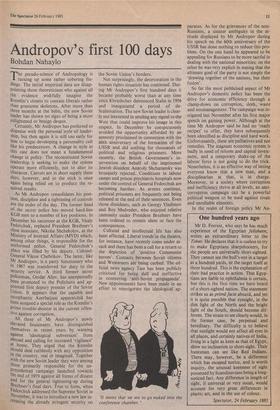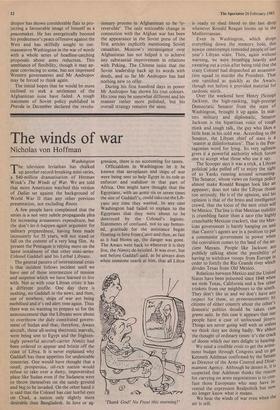Andropov's first 100 days
Bohdan Nahaylo
The pseudo-science of Andropology is
turning up some rather sobering fin- dings. The initial empirical data are disap- pointing those theoreticians who against all the evidence wishfully imagine the Kremlin's closets to contain liberals rather than gruesome skeletons. After more than three months at the helm, the new Soviet leader has shown no signs of being a more enlightened or benign despot.
Certainly, Mr Andropov has preferred to dispense with the personal style of leader- ship, but then again it is still too early for him to begin developing a personality cult like his predecessors. A change in style in this case does not mean a fundamental change in policy. The reconstituted Soviet leadership is seeking to make the system operate more efficiently, not to alter its character. Carrots are in short supply these days, however, and so the stick is once again being relied on to produce the re- quired results.
As Mr Andropov consolidates his posi- tion, discipline and a tightening of controls are the order of the day. The former head of the secret police has moved hard-line KGB men to a number of key positions. In December his successor at the KGB, Vitaly Fedorchuk, replaced President Brezhnev's close associate, Nikolai Shchekolov, at the Ministry of Internal Affairs (MVD) which, among other things, is responsible for the uniformed police. General Fedorchuk's Place was filled by his deputy, Colonel- General Viktor Chebrikov. The latter, like Mr Andropov, is a party functionary who in 1967 was transferred for duty to the security service. A third former secret Policeman, Geidar Aliev, has unexpectedly been promoted to the Politburo and ap- pointed first deputy premier of the Soviet Union. It appears that the capable and sycophantic Azerbaijani apparatchik has been assigned a special role as the Kremlin's prime trouble-shooter in the current offen- sive against corruption.
All three of Mr Andropov's newly elevated lieutenants have distinguished themselves in recent years by warning against 'ideological subversion' from abroad and calling for increased 'vigilance' at home. They urged that the Kremlin Should deal ruthlessly with any opposition in the country, real or imagined. Together with the new Soviet leader they were among those primarily responsible for the un- precedented campaign launched towards the end of 1979 against all forms of dissent and for the general tightening-up during Brezhnev's final days. True to form, when Fedorchuk addressed the Supreme Soviet in November, it was to introduce a new law in- creasing the already stringent security on the Soviet Union's borders.
Not surprisingly, the deterioration in the human rights situation has continued. Dur- ing Mr Andropov's first hundred days it became probably worse than at any time since Khrushchev denounced Stalin in 1956 and inaugurated a period of de- Stalinisation. The new Soviet leader is clear- ly not interested in sending any signal to the West that could improve his image in this respect. In December he conspicuously avoided the opportunity afforded by an amnesty proclaimed in connection with the 60th anniversary of the formation of the USSR and did nothing for thousands of political and religious prisoners. More recently, the British Government's in- tervention on behalf of the imprisoned Jewish dissident Anatoly Shcharansky was brusquely rejected. Conditions in labour camps and prison psychiatric hospitals now under the control of General Fedorchuk are becoming harsher. As arrests continue, political prisoners are frequently not being released at the end of their sentences. Even those dissidents, such as Georgy Vladimov and Roy Medvedev, who enjoyed relative immunity under President Brezhnev have been ordered to remain silent or face the consequences.
Cultural and intellectual life has also been affected. Liberal trends'in the theatre, for instance, have recently come under at- tack and there has been a call for a return to the depiction of 'positive Communist heroes'. Contacts between Soviet citizens and Westerners are being curbed. The of- ficial news agency Tass has been publicly criticised for being dull and ineffective in countering 'anti-Soviet propaganda'. New appointments have been made in an effort to reinvigorate the ideological ap-
it seems that we are to go nuked into the conference chamber.'
paratus. As for the grievances of the non- Russians, a sinister ambiguity in the at- titude displayed by Mr Andropov during his speech on the 60th anniversary of the USSR has done nothing to reduce this pro- blem. On the one hand he appeared to be appealing for Russians to be more tactful in dealing with the national minorities; on the other he was very explicit in stating that the ultimate goal of the party is not simply the `drawing together of the nations, but their fusion'.
So far the most publicised aspect of Mr Andropov's domestic policy has been the drive for economic efficiency through a clamp-down on corruption, sloth, waste and mismanagement. The campaign was in- stigated last November after his first major speech on gaining power. Although at the time Mr Andropov said he had no 'ready recipes' to offer, they have subsequently been identified as discipline and hard work. Unfortunately, these are palliatives and not remedies. The stagnant economic system is badly in need of reform and capital invest- ment, and a temporary shake-up of the labour force is not going to do the trick. Nonetheless, it is an effective way of letting everyone know that a new man, and a disciplinarian at that, is in charge. Moreover, in a society where corruption and inefficiency thrive at all levels, an anti- corruption campaign can be a powerful political weapon to be used against rivals and unreliable elements.
In the realm of foreign policy Mr An- dropov has shown considerable flair in pro- jecting a favourable image of himself as a peacemaker. He has energetically boosted his predecessor's peace offensive against the West and has skilfully sought to out- manoeuvre Washington in the war of words with a whole series of headline-catching proposals about arms reduction. This semblance of flexibility, though it may ap- pear convincing to some, has not impressed Western governments and Mr Andropov may be forced to think again.
The initial hopes that he would be more inclined to seek a settlement of the Afghanistan issue have faded. A tough statement of Soviet policy published in Pravda in December declared the revolu-
tionary process in Afghanistan to be 'ir- reversible'. The only noticeable change in connection with the Afghan war has been the appearance in the Soviet press of the first articles explicitly mentioning Soviet casualties. Moscow's intransigence over Afghanistan has not helped it to achieve any substantial improvement in relations with Peking. The Chinese insist that the Soviet leadership back up its words with deeds, and so far Mr Andropov has had nothing new to offer.
During his first hundred days in power Mr Andropov has shown his true colours. His tone may be somewhat different and his manner rather more polished, but his overall strategy remains the same.











































 Previous page
Previous page